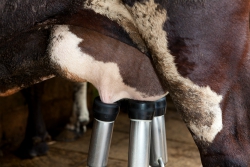Antibiotic-free treatment of dairy cows underway
Antibiotic resistance is increasing dramatically all over the world. As more and more bacteria become resistant to the antibiotics designed to kill them, they render these drugs ineffective, undermining our ability to treat common infectious diseases. Unless urgent action is taken, the World Health Organization foresees us entering a post-antibiotic era where common infections and minor injuries can once again prove fatal. The EU-funded project PanaMast is tackling the problem of antibiotic resistance by focusing on bovine mastitis, a commonly occurring inflammation of the udder affecting dairy cattle worldwide. While mastitis is normally treated using conventional antibiotics, PanaMast is developing the world’s first non-antibiotic solution to treat lactating cows. Health and economic benefits of the innovative technology Called long-acting reactive species (LARS), the novel non-antibiotic antimicrobial technology has so far been found to be effective against all tested microorganisms, including antibiotic-resistant bacteria such as methicillin-resistant Staphylococcus aureus (MRSA). More importantly, it doesn’t induce resistance. Highly effective against both gram-negative and gram-positive bacteria, LARS has also demonstrated an excellent safety/low toxicity profile in vivo and in vitro. It can be administered in different ways, including in aerosolised or nebulised form, and its low minimum inhibitory concentrations make it appropriate for a wide range of therapeutic applications. Besides the health advantages it presents, the new treatment also offers significant economic benefits to dairy farmers. With conventional antibiotics, farmers lose milk revenues, since milk from cows undergoing treatment cannot be sold for a period of time during and after treatment. Furthermore, when the antibiotics don’t work, infected cows have to be culled. This costs the European and American dairy industries over EUR 3 billion a year. But when infected cows are treated with LARS, milk can potentially be sold both during and after treatment, significantly benefiting farmers and milk producers. In a press release published by project leader Westway Health, CEO Dr Ruairi Friel explained the company’s innovative approach: “The genesis of the idea was knowing that there are other ways to kill bacteria like MRSA. This is done every day around the world using disinfectants for example, or through steam cleaning. What we have been able to develop is a new method of killing bacteria which does not harm living tissue. Our solution is based on a combination of compounds inspired by nature, and if we can develop and scale our solution we believe we can help tackle this global challenge of antibiotic-resistance.” By the end of the 24-month project, PanaMast (Progressing a non-antibiotic antimicrobial treatment for Bovine Mastitis towards market – PanaMast) intends to have completed the testing of its novel product and have it ready for market implementation (technology readiness level 8). Subject to regulatory approval by the European Medicines Agency, the aim is to have the product available on the market by 2021 or 2022. For more information, please see: PanaMast project web page
Countries
Ireland



